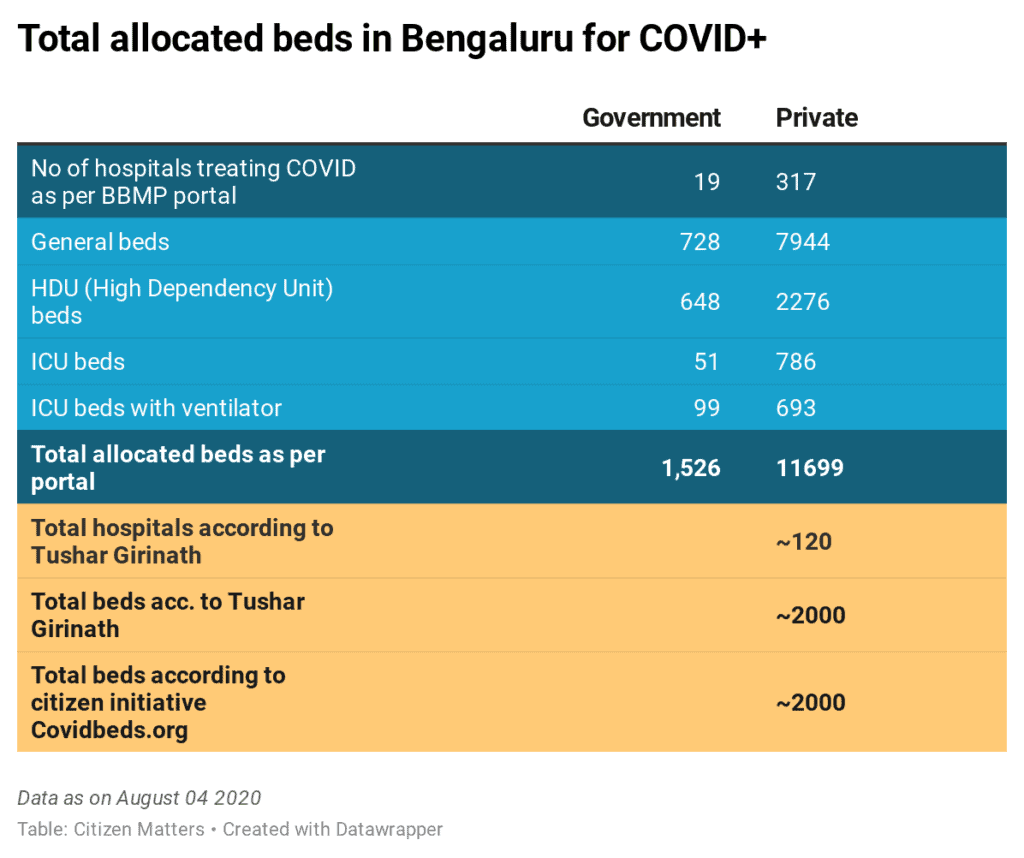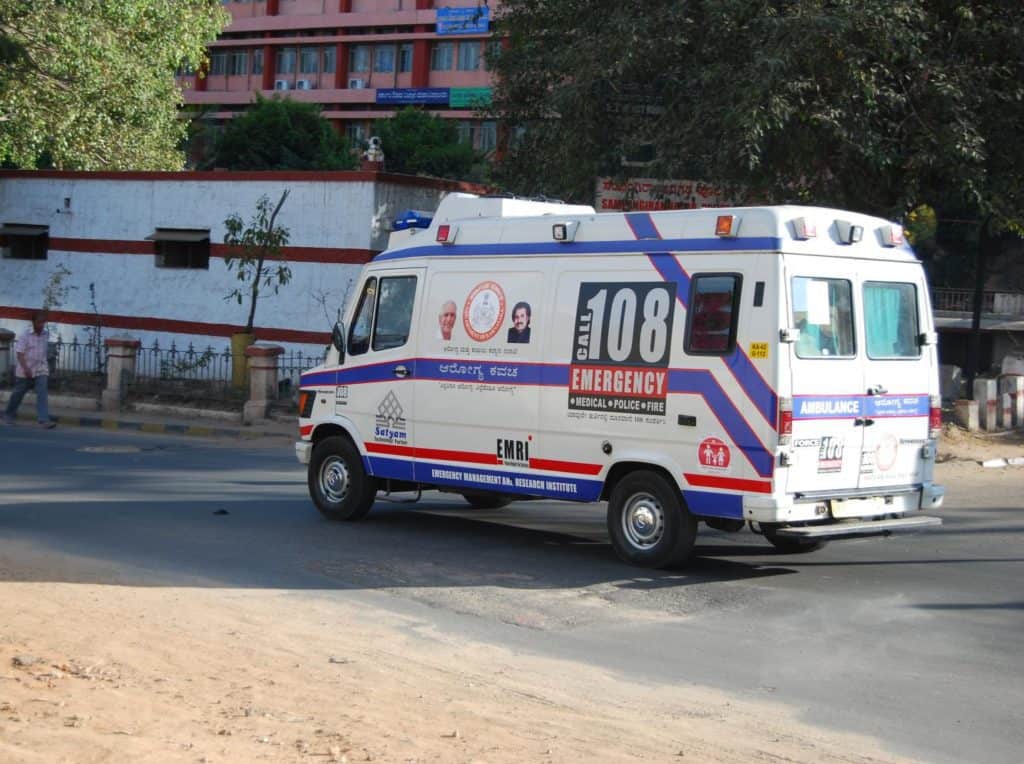Since COVID cases started surging in Bengaluru, we’ve heard of several reports of patients not finding hospital beds or being denied treatment. Most recently, even a COVID doctor at Chikkamudavadi PHC (Primary Health Centre) in Ramanagara district, Dr Manjunath S T, succumbed to the virus after being turned away by three Bengaluru hospitals.
Despite this, the government has maintained that there are enough COVID beds in the city. Towards the end of June, government had ordered that half the beds in all private hospitals would be reserved for COVID patients. On July 7, Dr K Sudhakar, Minister of Medical Education, claimed 78% of these reserved beds in private hospitals were vacant.
When I checked the BBMP portal on real-time bed availability on August 4, it too indicated that, of all the beds reserved for COVID across government and private hospitals, around 60% were vacant. The portal showed that 13,225 beds were reserved for COVID, of which 7,889 were vacant. And the bulk of the vacant beds (96%) were in private hospitals – 7,593 beds.
If so many beds are still vacant, why are private hospitals denying admissions and treatment when COVID patients approach them?
In reality, private hospitals only have about 2000 COVID beds
Tushar Girinath, Chairman of BWSSB (Bangalore Water Supply and Sewerage Board), who now manages BBMP’s centralised bed allocation system, admits that the government’s list of hospital beds is only a “wishlist”. Though the BBMP has empanelled 308 private hospitals, only 120 of these are treating COVID patients to some degree; the rest have either refused to take in COVID patients or don’t have the necessary equipment, he says.
Tushar says the list of beds was compiled in light of the government order to reserve 50% beds in all private hospitals for COVID treatment. “Every hospital which has a KPME number (Karnataka Private Medical Establishment ID) has been put on that list. But in reality, there have been many challenges in getting those beds.”
According to Tushar, BBMP and the state Health Department have managed to secure only 10-20% of the city’s private hospital beds, rather than 50%. He estimates there are only around 2000 private hospital beds overall for COVID patients now, though the BBMP portal says there are over 11,000.
He explains why, “There are many challenges. Some hospitals are too small and can’t create separate COVID wards. Others don’t have the equipment or are refusing to set it up, and some just don’t want to do it. Government asked for 50% of their beds, but they only gave 10-20%.”
Dr Giridhar Babu, a member of the state government’s COVID expert committee, explains that a COVID patient in Bengaluru has three options for hospitalisation:
- Government hospital: Admission through BBMP’s centralised bed allocation system. Treatment is free of cost.
- Private hospital (Government quota): In June, government appointed the Suvarna Arogya Suraksha Trust (SAST) to empanel private hospitals that can provide subsidised COVID treatment. It also ordered private hospitals in the city to reserve 50% beds for COVID.
- Private hospital (Independent): Patients can use beds in private hospitals that have not been reserved by the government, based on the discretion of the hospital. Treatment is paid for by the patient, but a ceiling was introduced by the government.
Following is a list of beds allocated for COVID as per the BBMP portal, in comparison with estimates of what’s available in reality.

Complete disconnect between BBMP’s and hospitals’ data
Several hospitals say their bed numbers are different from what’s shown in the BBMP portal. For instance, the portal says that ACE Suhas Hospital in Jigani has a total of 25 beds allocated for COVID, of which two are ICU beds and two are ICU beds with ventilators. And that all 25 beds are unoccupied. But a senior doctor at ACE Suhas says that the hospital has only 10 beds, all of which are beds with ventilators. Moreover, all 10 beds are occupied, and have been, since the surge began. “We’ve been fully occupied since day one. As soon as a bed gets free, it is occupied within hours or even lesser,” he says, on condition of anonymity.
The senior doctor says that the hospital does have general category beds, but that not enough doctors and nurses are available for these; besides, many non-COVID patients are already occupying these beds.
Other hospitals have similar stories to tell. The BBMP portal says that Ananya Hospital in Rajajinagar has 25 beds allocated for COVID, all of which are general beds. Of these, 21 are supposed to be free. But a senior office-bearer at the hospital says they are able to reserve only 11-12 beds for COVID patients currently, and not 25, since many of their doctors and nurses aren’t working now.

Echoing Tushar, hospitals say that one of the reasons for the discrepancy is that BBMP allocated a percentage of the total beds in the hospital based on its own discretion. The senior doctor from ACE Suhas Hospital says, “They put 50% of total beds as per the government order. That’s why our number [in the portal] is 25 instead of 10.”
However, Manipal Northside Hospital in Malleswaram says the number in the BBMP portal is correct in their case – 38 general beds for COVID patients. “BBMP is managing the whole hospital now and we only treat COVID patients here,” says a senior doctor at the hospital.
Survey shows govt’s bed data was wrong from the start
Santosh Doddiah, founder of Covidbeds.org, started tracking the number of COVID beds in Bengaluru in early July. The platform tracks real-time bed status, and updates availability every day. Santosh was confused by K Sudhakar’s claims even as reports of patients not finding beds had become common. An acquaintance of his too had succumbed to COVID after being denied treatment in 16 hospitals.
He says, “I’ve called over 150 hospitals and spoken to dozens of patients looking for beds. I can say with certainty that the actual numbers are much lower”.
Santosh conducted his first survey when the government released their first few lists of private hospitals at the start of July. According to Sudhakar’s list released on July 5, 3,331 beds in 72 private hospitals were allocated for COVID in the city, of which 2,598 (78%) were vacant.
Santosh conducted a survey of 71 of the listed hospitals on July 5, interviewing doctors/administrators to verify the data. The survey explained why so many patients struggled to find beds.
It found that:
- 29 out of the 71 hospitals did not treat COVID patients because they were not equipped for it or were still preparing beds
- Allocated beds were 1,676, not 3,331
- Vacant beds were just 437, not 2,598!

Since the first survey, Santosh has continued to call COVID-empanelled hospitals regularly. “It’s hard to have a similar survey now as the numbers are changing all the time, but according to our data, the numbers are still off.”
Like Tushar, Santosh too estimates that only around 2,000 private hospital beds are treating COVID patients. He says only 500-600 of these beds are vacant, in stark contrast to BBMP portal figures of 7593 today. Ventilator beds are particularly low in number and hard to find. Santosh estimates that only 70-80 private hospitals are treating COVID patients.
Bengaluru has been averaging 1,500-2,500 new cases per day in the past 10 days. Considering there are only around 3,500 COVID beds in the city overall – around 1,500 in government hospitals plus 2,000 in private hospitals – it’s no surprise that several patients have been denied treatment.
[In Part 2 of this series, we explore why private hospitals have not caught up to government’s expectations on bed availability and treatment.]
Also read:
► Why Bengaluru hospitals are refusing to admit COVID patients
► COVID response: “Bengaluru is overlooking every management lesson from history”
► Battling addiction online: How COVID-19 has changed support groups for alcoholics
R u guiding needy persons- needing treatment, specially those who are working alone in bangalore, though of other states. If yes, kindly share contact no.
Iam to go for a Hernia surgery in Apollo spectra Koramangala since covid test is mandatory covid test is done yesterday morning and iam to get the outcome today evening If at all positive can you please suggest me a good caring Govt Hispital where I can get admitted. Iam 69 years Male with heart ailments. Since I have developed hernia acute pains I need to get the surgery done at the earliest Can you please guide me